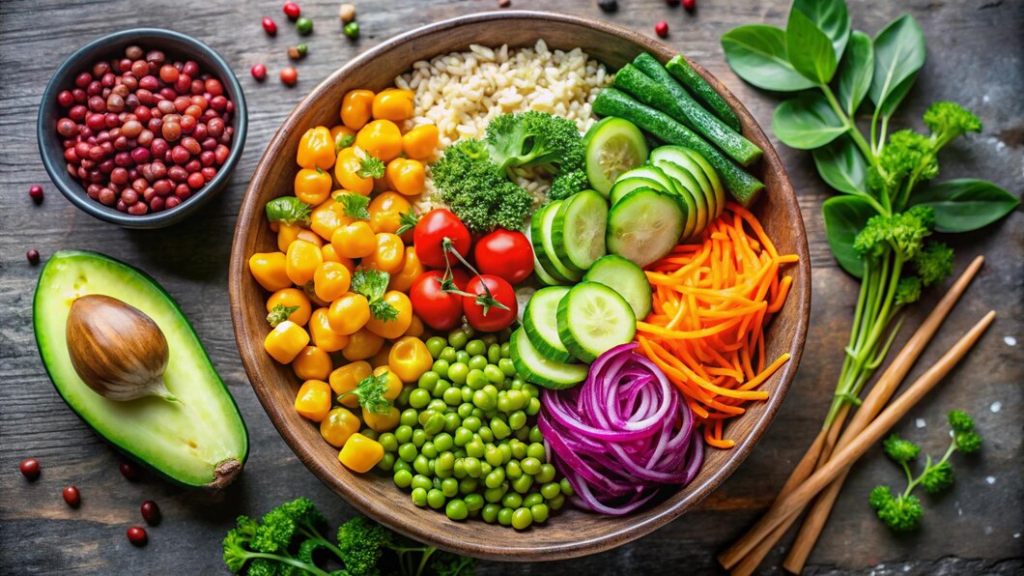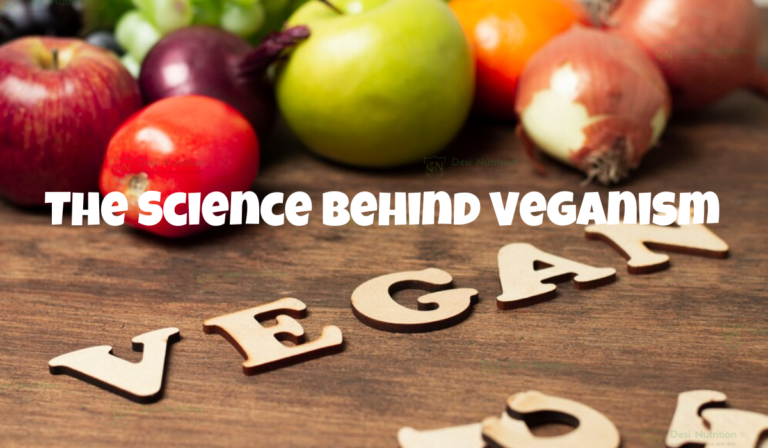The rise in veganism has sparked an interest even in people who do not know the basics of the movement. People often hear others say they should go vegan for various reasons. But many of them do not know the science behind it. In this article, we will discover the science behind veganism and understand the nutritional needs and dietary impacts.
Veganism started as a moment for ethical and environmental reasons where people won’;t eat meat or related products or use any animal-product so they can ensure a cruelty free environment for animals. But slowly and gradually people realized that it comes long with its health benefits. So vegans have their own reason for going vegan. Whether for ethical reasons or health reasons, a vegan needs to know the science behind veganism so you do not compromise with the nutrients that your body needs to function.
When you opt for veganism, you will go through many changes including physical, physiological, and emotional.
1. The Basics of Vegan Nutrition

First of all let’s understand the basics of vegan nutrition. A vegan will have to eliminate all the animal-based products from their diet. This means you would be at risk of nutrient deficiency that you mostly get from some of the animal products. But don’t worry, now the culinary field has evolved and you have multiple alternatives for animal products.
A vegan diet will include plant-based food sources like vegetables, legumes, grain (which make the most part of your diet) nuts and seeds.
You surely will get multiple health benefits from a vegan diet but again, you need to be careful when it comes to nutrient intake. Here are the essential nutrients you need to consume and the reasons behind their consumption.
Proteins and Amino Acids
Proteins are the building block of your body. They are made of amino acids and nine of these are essential which you get from food. Animal-products provide all the nine amino acids but you, as vegan, can achieve the same balance throughout a plant-based diet.
The key protein sources for you are:
- Legumes (lentils, chickpeas, black beans)
- Tofu and tempeh
- Seitan (wheat gluten)
- Quinoa and buckwheat (complete proteins)
- Nuts and seeds (e.g., chia seeds, hemp seeds, almonds)
Ensure you meet your protein needs by consuming a variety of plant-based foods. Prepare meals with the combination of different plant sources like grains and legumes so you can get all the essential amino acids.
Vitamin B12
Vitamin B12 is a vitamin naturally found in animal products. SO as a vegan you need to monitor this nutrient because it plays an essential role in the formation of red blood cells, DNA synthesis and nerve function. A deficiency in B12 can lead to fatigue, cognitive issues and anemia.
Key Sources for Vegans:
- Fortified plant milks and cereals
- Nutritional yeast fortified with B12
- B12 supplements
Since vegans don’t include animal products in their diet, they are at a high risk of B12 deficiency. To overcome this, they need to consume fortified foods or supplements to ensure healthy levels of the vitamin in their body.
Iron
Your body needs iron to ensure oxygen transportation throughout the body. Plant-based food sources provide non-heme iron which is less easily absorbed than the heme iron which is found in animal-products. Vegans have to consume enough iron and pair it with vitamin C to enhance the absorption.
Key Iron Sources:
- Lentils, chickpeas, and beans
- Tofu and tempeh
- Spinach and kale
- Pumpkin seeds and quinoa
To have adequate levels or iron in your body you need to consume plant-based sources of iron by pairing them with vitamin C sources of food.
Omega-3 Fatty Acids
Omega-3 fatty acids are crucial for brain function, cardiovascular health and reducing inflammation. Fish is the common source of omega-3; however, vegans can obtain these fatty acids from plant-based sources as well.
Key Sources for Vegans:
- Flaxseeds and flaxseed oil
- Chia seeds
- Hemp seeds
- Walnuts
- Algal oil (a direct source of DHA and EPA)
Algal oil is a good source of DHA and EPA to ensure the levels of omega 3 in their body. Omega-3 comes in two forms, one found in plants and the others in animals. ALA (alpha-linolenic acid) is found in plants and the body can convert it into DHA and EPA but the process is inefficient; that is why you need a direct spruce which is algal oil.
2. Health Benefits of a Vegan Diet

Many, many people are turning to vegan diets because of its multiple health benefits. By focusing on a plant-based diet, you will be consuming more fiber, antioxidants, vitamins and minerals and avoid risks associated with animal-products.
Cardiovascular Health
A vegan diet ensures an improved cardiovascular health because they eat food which helps to maintain your cholesterol levels, reduce your blood pressure and lower the risk of heart diseases.
Vegans experience a positive impact on their heart health because they focus on plant-based foods which do not contain saturated fats from meat and dairy. They combine their meals with high fiber content from plant-foods. These meals help to reduce cholesterol and improve blood pressure.
Lower Risk of Type 2 Diabetes
Vegans are at the lower risk of type 2 diabetes. The plant-based foods that vegan diet includes ensure to control blood sugar levels. The meals are rich in fiber like grains and legumes along with vegetables. All of these foods are low glycemic index foods which help to regulate blood sugar levels.
Higher intake of fiber and low intake of processed foods without saturated fats improves insulin sensitivity and reduces inflammation both of which are key factors in managing blood sugar levels.
Weight Management
Plant-based diet is rich in fiber which helps you to feel full for a longer time. This helps reduce your hunger pangs and you won’t consume more food than necessary which will help to maintain your weight. Not only this, plant-based foods are naturally low in calories making them an ideal food option for people looking for weight loss or management.
3. Potential Nutritional Challenges
Veganism comes with multiple health benefits but one thing you need to keep in mind that you would be facing multiple challenges while opting for a vegan lifestyle. One should opt for veganism with proper planning. However you can’t expect your plan to turn out as it is but at least you would be mentally prepared to acknowledge the challenges and overcome them. Planning your vegan meals would be effective for you so you don’t miss out on key nutrients.
Calcium and Bone Health
Calcium helps to maintain strong bones. Dairy is the most common source of calcium for you but as a vegan you still have multiple options to fulfill your calcium requirements.
Key Calcium Sources:
- Fortified plant milks (soy, almond, oat)
- Tofu (made with calcium sulfate)
- Leafy greens (collard greens, bok choy)
- Almonds and sesame seeds
If you are a vegan, ensure to take notice of your calcium intake. You need it at every stage of your life particularly growth, pregnancy or aging. So, try to incorporate calcium in your daily diet through various other sources.
Vitamin D
Vitamin D is an essential vitamin for bone health and immune function. A lack of it can lead to issues related to bone and immune system. You get vitamin D mainly from animal-based foods, primarily dairy products. But vegans still have options. You can rely on fortified foods or supplements to meet your body’s need for calcium.
Key Sources for Vegans:
- Fortified plant milks and orange juice
- Mushrooms exposed to sunlight
- Vitamin D supplements (D2 or D3 from lichen)
Vegans who live in regions with limited sun exposure need to keep a track of their intake of vitamin D. You get vitamin D for sunlight as well, since your region does not get enough sunlight ensure to add supplements with vitamin D in your diet. Be vary of winter months and ensure to consume fortified foods or supplements.
4. Environmental and Ethical Impacts
People should know that veganism is a choice for many people for various reasons, one of them being environmental and ethical reasons. Some people opt for a vegan lifestyle because of its impact on the environment and animal welfare.
Environmental Sustainability
By eliminating animal products, vegans contribute significantly to reduce their carbon footprint. Animal agriculture contributes to deforestation, water scarcity and greenhouse gas emissions. Moreover, plant-based diets require less land and water which is a sustainable way to feed a growing global position.
Animal Welfare
Animal welfare is a driving force for many vegans because of the unethical practices going on in animal agriculture. The elimination of factory farming, reducing animal suffering, and promoting cruelty-free lifestyles are central to the vegan philosophy.
Frequently Asked Questions
Is veganism scientifically healthy?
Ans. Vegan diets could be a part of your healthy lifestyle if planned and implemented properly. They are a healthy dietary approach that requires you to plan your meals and ensure the intake of every nutrient, including the ones that you get majorly from animal products. Ensure you are consuming foods or supplements that have protein, vitamin D andB12, omega-3 fatty acids, iron and calcium.
What is the logic behind being a vegan?
Ans. Veganism works on the principle that says no to animal products. From meat and related products to dairy and honey, you have to eliminate products that come from animal agriculture.
What is the best age to become vegan?
Ans. There is no “best” age to become a vegan. You can opt for veganism at any age. You can even raise your child a vegan as long as their diets include all the vital nutrients. It’s always about the nutrients rather than the dietary approach you choose for your lifestyle. Make sure you choose the right approach to maintain your health.




